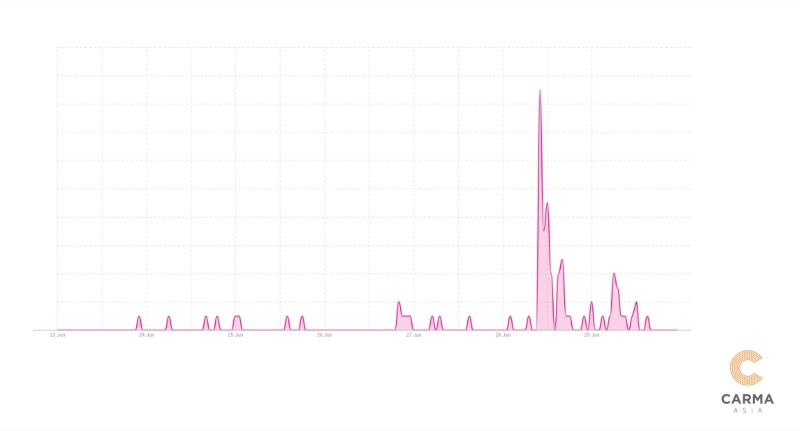



What role can social media play for former political leaders?
share on
Hong Kong’s outgoing leader Carrie Lam shared her plans to shut down her social media accounts after stepping down on 30 June 2022, before the 25th anniversary of the city’s handover. Lam made her final statements on her Facebook and Instagram accounts on 28 June 2022, stating that her five-year term had led to her publishing over 600 Facebook posts and more than 500 Instagram posts. Both accounts will shut down on 30 June 2022. She also thanked HongKongers for engaging and interacting with her posts.
Her announcement on stepping away from the social media spotlight saw social media saw a peak in activity from 10 to 11am on 28 June 2022, right after Lam indicated that it was her last post on Facebook, said media monitoring company CARMA. At the time of writing, the post generated a total of 1.8k comments and 200 shares. CARMA's data indicated that the most engaged comment came from a Facebook user who thanked Lam for her contribution and wished her the best in her future endeavours.

Lam, has repeatedly mentioned that she is not seeking a second term, and as such her departure from social media has raised questions on whether she is looking for ways to keep away from media spotlight. Given that many leaders globally keep an active social media presence even after relinquishing of power, Lam's statement has left many wondering whether she misses the privacy and wants to exit being in the public eye, said Jose Raymond, director of strategic advisory at PRecious Communications. Raymond, who has had stints in the public service and journalism in Singapore, and also actively campaigned during the 2020 General Election in Singapore said when it comes to keeping a presence on social media "there is no hard and fast rule”.
“Some leaders would opt for privacy after their time in office. In Carrie Lam’s case, she did say that she was not seeking a second term as she wanted to spend more time with her family," Raymond added. Ultimately it is up to the individual, said Raymond, comparing Lam’s decision to former US President Barack Obama who continues to use his social media accounts to talk about issues or push for changes in society.
Commenting on the power of social media in today’s political scene, Raymond shared that this is of growing importance in supplementing any politician’s ground work. “Social media and other forms of online marketing will continue to be relevant for politicians. In some countries, politicians may need to depend of social media for outreach as they may not be able to shake every single voter’s hands,” he said adding:
What we need to take more notice of now is how Web 3.0 will impact political marketing and outreach in the near future.
Echoing a similar sentiment is David Lian, managing director of Asia, growth & innovation at Zeno Group, "I feel the need to remain in social media post term varies from leader to leader. Some leaders have a wider platform beyond their elected position, some are very private people who only come into the public eye due to their position," said Lian. Lian added that having a social media presence is essentially to have a channel for any leader’s voice, and many use their established following to position themselves as thought leaders or promote new ventures.
For active politicians, he shared that participation in the discourse for social media is inseparable from engaging in public discourse today - which all politicians do. "Social media has become yet another important channel - if not the most important today! This is especially for those in or running for office to set and communicate their agenda with their electorate," he said.
Meanwhile, Ken Cheung, co-founder and digital director at KREW DIGITAL said that it is explicable that politicians might have other personal developments after leaving the government role. He added that while it is the personal choice of any politician to leave the sight of public, "social media followers could be a strong asset for converting one’s political influence to business value."
Cheung also took former HK 's Financial Secretary John Tsang as an example, saying that his social media account remains active and endorses an insurance brand and NFT platform, "Certainly, his charisma and a professional social media team also contributed to the success." He added:
On the flip side, if the political leaders have been in PR crisis or turmoil and have made the decision to not be involved in public facing business roles, shutting down the account can avoid adverse comments and can be seen as a better option.
It is safe to say that the global use of social media has changed the way politics is played today across the world. Many discussions and election strategy is now execution on social media. A research by Pew Research however found that in the US, only 9% of adult social media users say they often post or share their views on political or social issues on social media. Around 70% of social media users say they never (40%) or rarely (30%) do so due to worries around the content being used against them or being attacked on their view. Meanwhile, during the recent election season, 55% of Americans said they were worn out by political posts on social media.
Related articles:
Bittersweet outcome for Fitbit after Carrie Lam Facebook fiasco
SG govt proposes codes for social platforms to remove harmful content
share on
Free newsletter
Get the daily lowdown on Asia's top marketing stories.
We break down the big and messy topics of the day so you're updated on the most important developments in Asia's marketing development – for free.
subscribe now open in new window
